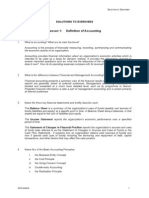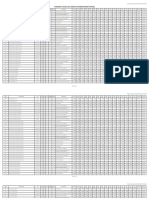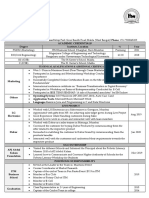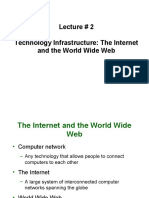Case Study 2
Uploaded by
8142301001Case Study 2
Uploaded by
8142301001120 FINANCIAL ACCOUNTING: AN INTEGRATED APPROACH
3.13 Homework and discussion to develop understanding
PROBLEM 3.1* Define terms
Define the following terms in your own words:
1 revenue
2 expense
3 net profit
4 dividend
5 retained profits
6 shareholders' equity.
PROBLEM 3.2* Basic balance sheet, net profit and retained profits ideas______________________
, Labott's Bottlery Pty Ltd had the following recent balance sheet as at 30 September 1997:
$ $
Cash 1 642 Mortgage 1 000
Inventory 1 480 Share capital 3 000
Land* 2 100 Retained profits 1 222
5 222 5 222
These questions start you out in chapter 2 and take you into chapter 3, to help you think
of accounting in an integrated way, not just as a set of disconnected chapter-by-chapter
subjects.
1 Why is 'land' on the balance sheet, and what does it represent?
2 On 5 October 1997 the company borrowed $2410 from the bank and used the money
immediately to buy more land. What was the total dollar figure of the company's assets after
this point?
3 Why did the company not just use the $3000 share capital to buy more land instead of
borrowing from the bank?
4 Explain how 'retained profits' comes to be on the balance sheet and what it represents.
5 For the year ended 30 September 1997 the company's revenues were $10 116 and its
expenses (including income tax) were $9881. What was its net profit for the year?
6 During the year ended 30 September 1997 the company declared dividends of $120.
Considering this and point 5, what was the balance in retained profits at the beginning of
that year (1 October 1996)?
7 If the 1997 expenses were $11 600 instead of the figure in point 5, and the company did not
declare any dividends, what would the retained profits be at 30 September 1997?
8 The answer to point 7 is a negative number, which would be a debit. Would you think such
a debit should be shown with the assets on the left side of the company's balance sheet?
Why or why not?
PROBLEM 3.3* Prepare a simple set of financial statements from accounts
Following are account balances of Arctic Limo Services Pty Ltd. Prepare a 1998 profit and loss
statement, a 1998 statement of retained profits, and comparative 1997 and 1998 balance
sheets. State any assumptions you feel are necessary.
FINANCIAL PERFORMANCE: THE PROFIT AND LOSS STATEMENT 121
30 September 1998 30 September 1997
Debit (Credit) Debit (Credit)
$ $
Accumulated depreciation (30 000) (20 000)
Cash on hand 2 000 4 000
Dividends declared 80 000
Due from Lucky Eddie 1 000
Due to Amalgamated Loansharks (10 000)
Income tax expense 35 000
Limousines depreciation expense 10 000
Limousines cost 90 000 60 000
Long-term limousine financing (50 000) (30 000)
Other expenses 70 000
Retained profits harusnya 9000 (4 000) (4 000)
Revenue (300 000)
Share capital (1 000) (1 000)
Wages expense 100 000
Wages payable (2 000)
0 0
PROBLEM 3.4* Explain terms in non-technical language
Explain the following in non-technical language that a business person who has not read this
text would understand:
1 What is net profit as it is meant in financial accounting?
2 Why is net profit part of shareholders' equity?
3 If net profit is part of shareholders' equity, why is it necessary to have a separate profit and
loss statement? Why not just report net profit on the balance sheet?
4 Why are dividends to shareholders not considered to be an expense in calculating net profit?
Employee wages are considered an expense, as is the cost of products delivered to customers,
and shareholders must be kept happy, as must employees and customers.
PROBLEM 3.5* Prepare financial statements from transactions
At the end of last year, Fergama Production Pty Ltd, a company in the movie industry, had the
following balance sheet accounts (in no particular order).
$ $
Cash 23 415 Share capital 20 000
Accounts payable 37 778 Office equipment cost 24 486
Accum. depreciation 11 134 Accounts receivable 89 455
Retained profits 51 434 Inventory of supplies 10 240
Long-term loan payable 15 000 Taxes payable 12 250
During this year, the company's activities resulted in the following:
a Revenue, all on credit, totalled $216 459.
b Production expenses totalled $156 320, $11 287 of which were paid in cash and the rest
charged.
c Depreciation on the office equipment came to $2680 for the year.
d The company bought, on credit, new supplies costing $8657, and used up supplies costing
$12 984 during the year.
e Income tax expense for the year was estimated to be $12 319.
V22 FINANCIAL ACCOUNTING: AN INTEGRATED APPROACH
f The board of directors declared a dividend of $25 000.
g Collections from customers totalled $235 260.
h Payments to suppliers totalled $172 276.
i Payments of taxes totalled $18 400.
j A $5000 payment was made on the long-term loan.
k The dividend was paid in cash to shareholders.
Required:
1 To get you started, prepare a balance sheet for Fergama Productions Pty Ltd as at the end of
the last year.
2 Record the activities for this year using accounting entries and enter those entries to
accounts (using paper or a computer spreadsheet).
3 Prepare a trial balance of your accounts to show that it is in balance (if you are using a
computer spreadsheet, it should do this for you).
4 From those accounts, prepare the following financial statements:
a profit and loss statement for this year
b statement of retained profits for this year
c balance sheet at the end of this year (it would be useful to prepare a comparative balance
sheet for this year and last year together).
5 Comment on what the financial statements show about the company's performance for this
year and financial position at the end of this year. Would you say the company is better off
than it was last year?
PROBLEM 3.6 Indicate the effects of transactions
With respect to the current accounting period, state whether each of the following independent
transactions decrease a net profit, b the balance in the cash account or c both.
1 recognition of depreciation
2 repayment of a loan
3 payment of a cash dividend
4 payment of an advertising invoice which had been recorded as an expense in the previous
period
5 recording a bad debt
6 payment of wages for the period
7 purchase of a block of land for cash
PROBLEM 3.7 Indicate the effect of failure to record transactions______________________________
Using the notation 0/S (overstated), U/S (understated) and N/E (no effect) indicate the effect
on assets, liabilities, shareholders' equity and net profit before tax of failing to record each of
the following independent transactions or events:
a a $200 000 piece of equipment purchased on credit
b $30 000 inventory purchased on account
c sale of inventory (costing $30 000) on credit for $50 000
d a loan received from the bank for $80 000
e payment of wages of $100 000 for the period.
124 FINANCIAL ACCOUNTING: AN INTEGRATED APPROACH
PROBLEM 3.11 Ascertain the unknowns in the accounting equation
Find the unknowns for PAL Pty Ltd given the following information:
$m
Assets 1 July 1996 600
Assets 30 June 1997 800
Liabilities 1 July 1996 200
Liabilities 30 June 1997 300
Share capital 1 July 1996 160
Share capital 30 June 1997 180
Retained profits 1 July 1996 7
Retained profits 30 June 1997 7
Revenues for the year 7
Expenses for the year 600
Dividends 100
PROBLEM 3.12 Complete transaction analysis and prepare financial statements____________________
The following transactions occurred for the month of November 1997 for Hoad Pty Ltd:
a The company was incorporated with shareholders investing $200 000 in cash.
b Purchased inventory for cash, $20 000.
, c Paid $4000 for a month's rent on the premises.
d Purchased inventory on credit, $30 000.
e Received an advertising bill for newspaper advertisement to promote the new company. The
$1000 will be paid in May.
f Inventory with a cost of $40 000 was sold on credit for $90 000.
g Paid $25 000 of accounts payable.
h Received $30 000 from accounts receivable.
i Paid wages of $15 000.
j Paid sales commission at the rate of 1% on sales made during the month.
k Purchased a new computer for $6000, paid $3000 in cash and $3000 to be paid in 15 months'
time.
I Owed employees $2000 in wages at the end of the month.
Required:
1 Show the effect of each of the above transactions on the accounting equation.
2 Prepare a profit and loss statement and a balance sheet at 30 November 1997.
3 Prepare journal entries for each transaction and determine the balances for each account
(as done in section 3.8).
PROBLEM 1.13 Complete transaction analysis and prepare financial statements
The abridged balance sheet for Roche Pty Ltd at 31 August 1997 was as follows:
Assets Liabilities and shareholders' equity
$ $
Cash 100 000 Accounts payable 200 000
Accounts receivable 400 000 Long-term loan 300 000
Inventory 600 000 Share capital 900 000
Prepayments 70 000 Retained profits 240 000
Equipment 600 000
Accumulated depreciation (130 000)
1 640 000 1 640 000
You might also like
- Get Rich with Dividends: A Proven System for Earning Double-Digit ReturnsFrom EverandGet Rich with Dividends: A Proven System for Earning Double-Digit ReturnsNo ratings yet
- Introduction To Financial Accounting: Key Terms and Concepts To KnowNo ratings yetIntroduction To Financial Accounting: Key Terms and Concepts To Know16 pages
- TOPIC 21 Preparation of Financial Statement For Companies ANSWERSNo ratings yetTOPIC 21 Preparation of Financial Statement For Companies ANSWERS9 pages
- Chapter 1 - Introduction To Financial AnalysisNo ratings yetChapter 1 - Introduction To Financial Analysis42 pages
- Chapter 1 - Financial Statements and Reports100% (1)Chapter 1 - Financial Statements and Reports44 pages
- Power Point Slides - Week 2 (Canvas) - 2No ratings yetPower Point Slides - Week 2 (Canvas) - 237 pages
- Bodie Merton - Finance - Instructor_s Manual-Chap3No ratings yetBodie Merton - Finance - Instructor_s Manual-Chap318 pages
- Slides Review - Final - Exam Prof. EnacheNo ratings yetSlides Review - Final - Exam Prof. Enache126 pages
- Income Statement: Results of Operating Performance: 15.501/516 Accounting Spring 2004No ratings yetIncome Statement: Results of Operating Performance: 15.501/516 Accounting Spring 200459 pages
- Solutions Manual: Accounting: Building Business SkillsNo ratings yetSolutions Manual: Accounting: Building Business Skills31 pages
- Introduction To Accounting and Business: Discussion Questions100% (1)Introduction To Accounting and Business: Discussion Questions46 pages
- Model Paper BMB103 With Solution Batch 2024-26No ratings yetModel Paper BMB103 With Solution Batch 2024-2620 pages
- Intermediate Accounting Solutions Chapter 363% (8)Intermediate Accounting Solutions Chapter 327 pages
- ANS 2016 MARCH - Financial - Accounting - Reporting - Fundamentals - March - 2016 - English - MediumNo ratings yetANS 2016 MARCH - Financial - Accounting - Reporting - Fundamentals - March - 2016 - English - Medium16 pages
- Introduction To Accounting - Week 8 & 9No ratings yetIntroduction To Accounting - Week 8 & 927 pages
- Solution Manual for College Accounting, 22nd Editiondownload100% (5)Solution Manual for College Accounting, 22nd Editiondownload64 pages
- Accounting What The Numbers Mean 11th Edition Marshall McManus Viele 1259535312 9781259535314 Solution Manual100% (50)Accounting What The Numbers Mean 11th Edition Marshall McManus Viele 1259535312 9781259535314 Solution Manual36 pages
- Access Solution Manual for College Accounting, 22nd Edition All Chapters Immediate PDF Download100% (2)Access Solution Manual for College Accounting, 22nd Edition All Chapters Immediate PDF Download55 pages
- Financial Accounting and Analysis June 2022No ratings yetFinancial Accounting and Analysis June 202210 pages
- J.K. Lasser's Small Business Taxes 2021: Your Complete Guide to a Better Bottom LineFrom EverandJ.K. Lasser's Small Business Taxes 2021: Your Complete Guide to a Better Bottom LineNo ratings yet
- GS 08 50208 SMDS Wax Plant Expansion PPD RevB1 PDFNo ratings yetGS 08 50208 SMDS Wax Plant Expansion PPD RevB1 PDF28 pages
- Form 1 Assignment/Practice Extension Form: Module/Assessment or Placement DetailsNo ratings yetForm 1 Assignment/Practice Extension Form: Module/Assessment or Placement Details3 pages
- 4 Th. Stage Methods of Construction and Estimation (Yousif Salam Shwani)No ratings yet4 Th. Stage Methods of Construction and Estimation (Yousif Salam Shwani)124 pages
- Cadbury Presentation - Group 3 - Consumer Behavior0% (1)Cadbury Presentation - Group 3 - Consumer Behavior28 pages
- Make A Copy and Edit in Google Slides. Download An Offline Copy and Edit in Microsoft PowerpointNo ratings yetMake A Copy and Edit in Google Slides. Download An Offline Copy and Edit in Microsoft Powerpoint43 pages
- Policy Clauses New India Mediclaim PolicyNo ratings yetPolicy Clauses New India Mediclaim Policy30 pages
- Your CFO Guy - Board Reporting - PortraitNo ratings yetYour CFO Guy - Board Reporting - Portrait6 pages
- Bank's Vulnerability To Money LaunderingNo ratings yetBank's Vulnerability To Money Laundering14 pages
- Lecture # 2 Technology Infrastructure: The Internet and The World Wide WebNo ratings yetLecture # 2 Technology Infrastructure: The Internet and The World Wide Web35 pages
- Archer Avenue St. Patrick's Day Parade 2024No ratings yetArcher Avenue St. Patrick's Day Parade 20242 pages
- Announcing SAP API Business Hub Next Gen Experience General AvailabilityNo ratings yetAnnouncing SAP API Business Hub Next Gen Experience General Availability8 pages
- Huawei eKitEngine AP661 Access Point DatasheetNo ratings yetHuawei eKitEngine AP661 Access Point Datasheet13 pages
- Get Rich with Dividends: A Proven System for Earning Double-Digit ReturnsFrom EverandGet Rich with Dividends: A Proven System for Earning Double-Digit Returns
- Introduction To Financial Accounting: Key Terms and Concepts To KnowIntroduction To Financial Accounting: Key Terms and Concepts To Know
- TOPIC 21 Preparation of Financial Statement For Companies ANSWERSTOPIC 21 Preparation of Financial Statement For Companies ANSWERS
- Bodie Merton - Finance - Instructor_s Manual-Chap3Bodie Merton - Finance - Instructor_s Manual-Chap3
- Income Statement: Results of Operating Performance: 15.501/516 Accounting Spring 2004Income Statement: Results of Operating Performance: 15.501/516 Accounting Spring 2004
- Solutions Manual: Accounting: Building Business SkillsSolutions Manual: Accounting: Building Business Skills
- Introduction To Accounting and Business: Discussion QuestionsIntroduction To Accounting and Business: Discussion Questions
- ANS 2016 MARCH - Financial - Accounting - Reporting - Fundamentals - March - 2016 - English - MediumANS 2016 MARCH - Financial - Accounting - Reporting - Fundamentals - March - 2016 - English - Medium
- Solution Manual for College Accounting, 22nd EditiondownloadSolution Manual for College Accounting, 22nd Editiondownload
- Accounting What The Numbers Mean 11th Edition Marshall McManus Viele 1259535312 9781259535314 Solution ManualAccounting What The Numbers Mean 11th Edition Marshall McManus Viele 1259535312 9781259535314 Solution Manual
- Access Solution Manual for College Accounting, 22nd Edition All Chapters Immediate PDF DownloadAccess Solution Manual for College Accounting, 22nd Edition All Chapters Immediate PDF Download
- J.K. Lasser's Small Business Taxes 2021: Your Complete Guide to a Better Bottom LineFrom EverandJ.K. Lasser's Small Business Taxes 2021: Your Complete Guide to a Better Bottom Line
- GS 08 50208 SMDS Wax Plant Expansion PPD RevB1 PDFGS 08 50208 SMDS Wax Plant Expansion PPD RevB1 PDF
- Form 1 Assignment/Practice Extension Form: Module/Assessment or Placement DetailsForm 1 Assignment/Practice Extension Form: Module/Assessment or Placement Details
- 4 Th. Stage Methods of Construction and Estimation (Yousif Salam Shwani)4 Th. Stage Methods of Construction and Estimation (Yousif Salam Shwani)
- Cadbury Presentation - Group 3 - Consumer BehaviorCadbury Presentation - Group 3 - Consumer Behavior
- Make A Copy and Edit in Google Slides. Download An Offline Copy and Edit in Microsoft PowerpointMake A Copy and Edit in Google Slides. Download An Offline Copy and Edit in Microsoft Powerpoint
- Lecture # 2 Technology Infrastructure: The Internet and The World Wide WebLecture # 2 Technology Infrastructure: The Internet and The World Wide Web
- Announcing SAP API Business Hub Next Gen Experience General AvailabilityAnnouncing SAP API Business Hub Next Gen Experience General Availability
























































































